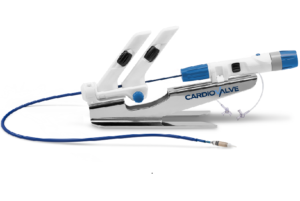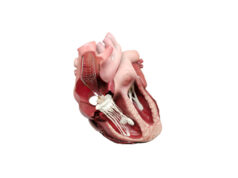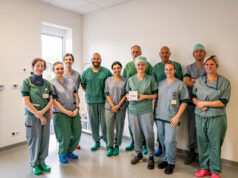
Cardiovalve has received US Food and Drug Administration (FDA) approval for an early feasibility study (EFS) of its transcatheter tricuspid valve replacement system for a tricuspid regurgitation (TR) indication. The Cardiovalve System has also been granted Breakthrough Device Designation status by the FDA.
A press release from the company outlines that Cardiovalve is the first privately held company to have the FDA’s EFS approval for both TR and mitral regurgitation (MR) indications.
Cardiovalve commenced the early feasibility study for TR in the USA earlier this year. The study’s primary endpoint is the safety and feasibility of the Cardiovalve technology and procedure in reducing tricuspid regurgitation, with evaluations at 30 days and periodically up to five years.
The company statement describes the Cardiovalve transcatheter system as a novel valve replacement device designed to replace the native mitral/tricuspid regurgitating valve by using a transfemoral procedure. It says the system avoids the need for open surgery or transapical delivery with mini-thoracotomy access. It lists benefits as including a short profile for minimal protrusion to the left or right ventricle; minimising interference with the cardiac blood flow (outflow tract obstruction) with an aim of improving safety and avoiding surgical risk; a robust design; and an enhanced sealing solution to prevent paravalvular leaks. The valve has three sizes to fit varying anatomies. Cardiovalve says that initial clinical results are promising, with high procedural success, and first patients demonstrating the durability of the implant have maintained clinical benefit for more than two years. The AHEAD US EFS IDE studies for both the mitral and tricuspid indications are approved and currently enrolling subjects in five centres in the USA. The AHEAD EU study for the mitral indication is enrolling subjects at multiple centres in Europe, including Germany, Italy, Lithuania, and Switzerland.
Primary investigator for the US TR study Azeem Latib (Montefiore Medical Center, New York, USA) says in the press release: “I am excited to finally have a truly percutaneous approach for treating TR. The Cardiovalve System is an innovative solution for an unmet clinical need. He will be presenting details of Cardiovalve’s technology and procedure, as well as the clinical EFS design, at CRT 2020 (22–25 February, National Harbor, Maryland, USA).
Amir Gross, chief executive officer of Cardiovalve, adds: “We are excited about the FDA’s recognition of the potential clinical benefit of the transcatheter tricuspid valve replacement system. We now have clinical data two years out that our implant is functioning as expected and the patient is improved clinically. FDA’s Breakthrough designation validates and reaffirms our commitment to improving and extending the lives of millions of patients suffering from heart valve disease across the world.”
Cardiovalve has developed an innovative transfemoral valve replacement system where the valve mimics current surgical replacement solutions that can fit both mitral and tricuspid indications, covering 90% of the patient population with three approved valve sizes, using the same delivery system.
“I have previously successfully performed initial First-in-Human cases with the Cardiovalve MR procedure. Now, the Cardiovalve system can be utilized in the Tricuspid location with the same transcatheter procedure. In fact, the Tricuspid is simpler and faster and, therefore, I anticipate similar procedural success,” explained Prof. Francesco Maisano, Head of Cardiovascular Surgery at Zurich University Hospital, Switzerland.











